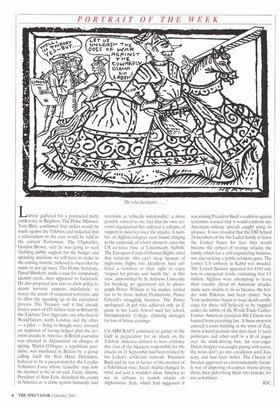PORTRAIT OF THE WEEK
'He who hesitates, . .
Labour gathered for a protracted party conference in Brighton. The Prime Minister, Tony Blair, confirmed that strikes would be made against the Taleban, and indicated that a referendum on the euro would be held in the current Parliament. The Chancellor, Gordon Brown, said he was going to start 'building public support for the budget and spending decisions we will have to make in the coming months'; believed to mean that he wants to put up taxes. The Home Secretary, David Blunkett, made a case for compulsory identity cards, then appeared to backtrack. He also proposed new laws to allow police to detain terrorist suspects indefinitely, to freeze the assets of suspected terrorists, and to allow the speeding up of the extradition process. The Treasury said it had already frozen assets of £55 million held in Britain by the Taleban. Two Algerians, one who lives in Wood Green, north London, and the other — a pilot — living in Slough, were arrested on suspicion of having helped plan the terrorist attacks in America. A British journalist was arrested in Afghanistan on charges of spying. Martin O'Hagan, a republican journalist, was murdered in Belfast by a group calling itself the Red Hand Defenders, believed to be a pseudonym for the Loyalist Volunteer Force whose 'ceasefire' may now be deemed to be at an end. Gerry Adams, President of Sinn Fein, described the events in America as 'a crime against humanity' and
terrorism as 'ethically indefensible': a move possibly related to the fact that his own terrorist organisation has suffered a collapse of support in America since the attacks. A number of Afghan refugees were found clinging to the underside of a lorry about to enter the US air-force base at Lakenheath, Suffolk. The European Court of Human Rights ruled that residents who can't sleep because of night-time flights into Heathrow have suffered a violation of their right to enjoy 'respect for private and family life'. A film crew, admonished by St Andrews University for breaking an agreement not to photograph Prince William at his studies, turned out to be from Ardent Productions, Prince Edward's struggling business. The Prince apologised. A girl who achieved only an E grade in her Latin A-level sued her school, Hurstpierpoint College, claiming damages for loss of future earnings.
US AIRCRAFT continued to gather in the Gulf in preparation for an attack on the Taleban. America claimed to have evidence that four of the hijackers responsible for the attacks on 11 September had been trained by bin Laden's al-Qa'cda network. President Bush said he was in favour of the creation of a Palestinian state. Saudi Arabia changed its mind and said it wouldn't allow America to use its airbases to launch attacks on Afghanistan. Iran, which had suggested it was joining President Bush's coalition against terrorism, warned that it would confront any American military aircraft caught using its airspace. It was revealed that the FBI helped 24 members of the bin Laden family to leave the United States for fear they would become the subject of revenge attacks; the family, which has a civil engineering business, was also seeking a public-relations guru. The former US embassy in Kabul was invaded. The United Nations appealed for £160 million in emergency funds, estimating that 1.5 million Afghans were attempting to leave their country ahead of American attacks; many were unable to do so because the border with Pakistan had been closed. New York authorities began to issue death certificates for those still believed to be trapped under the rubble of the World Trade Center. Former American president Bill Clinton was banned from practising law. A Swiss motorist entered a court building in the town of Zug, threw a hand grenade and shot dead 14 local politicians and other staff in a fit of pique over his drink-driving ban. An over-eager Dutch shopper was caught paying with euros; the notes don't go into circulation until January, and had been stolen. The Church of Sweden approved an environmentally friendly way of disposing of corpses: freeze-drying them, then pulverising them into powder for use as fertiliser,
RJC


































































































 Previous page
Previous page